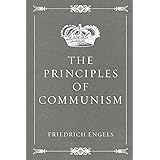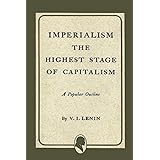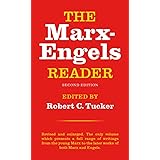One concern—it would have helped if Friedrich gave a better clarification of the communist basis to housing. In the text, he more or less concentrates on why the wrongness of others but does not give much of a look into the replacement that would exist under communism.

Enjoy fast, free delivery, exclusive deals, and award-winning movies & TV shows with Prime
Try Prime
and start saving today with fast, free delivery
Amazon Prime includes:
Fast, FREE Delivery is available to Prime members. To join, select "Try Amazon Prime and start saving today with Fast, FREE Delivery" below the Add to Cart button.
Amazon Prime members enjoy:- Cardmembers earn 5% Back at Amazon.com with a Prime Credit Card.
- Unlimited Free Two-Day Delivery
- Streaming of thousands of movies and TV shows with limited ads on Prime Video.
- A Kindle book to borrow for free each month - with no due dates
- Listen to over 2 million songs and hundreds of playlists
- Unlimited photo storage with anywhere access
Important: Your credit card will NOT be charged when you start your free trial or if you cancel during the trial period. If you're happy with Amazon Prime, do nothing. At the end of the free trial, your membership will automatically upgrade to a monthly membership.

Download the free Kindle app and start reading Kindle books instantly on your smartphone, tablet, or computer - no Kindle device required.
Read instantly on your browser with Kindle for Web.
Using your mobile phone camera - scan the code below and download the Kindle app.

The Housing Question Paperback – December 16, 2021
Purchase options and add-ons
In the early-1870s, an ideological debate began to unfold in the German press on the shortage of affordable housing available to workers in major industrial areas. The rapid increase in industrial production necessitating an increase in industrial workers created a housing crisis.
From June 1872 to February 1873, Fredrick Engels contributed a series of articles to the publication The Volksstaat (The People's State)titled "The Housing Question." Originally published as a booklet by the Co-Operative Publishing Society of Foreign Workers in the USSR and out of print for many years, INTERNATIONAL PUBLISHERS is proud to make this text available - as workers yet again face almost insurmountable obstacles to finding affordable housing.
As Engels wrote in 1872, "What is meant today by housing shortage is the peculiar intensification of the bad housing conditions of the workers as the result of the sudden rush of population to the big towns; a colossal increase in rents, a still further aggravation of overcrowding in the individual houses, and, for some, the impossibility of finding a place to live in at all."
Fredrick Engels' essays collected here as "The Housing Question" are just as relevant today, roughly 150 years after first written.
- Print length104 pages
- LanguageEnglish
- PublisherIntl Pub Co Inc
- Publication dateDecember 16, 2021
- Dimensions5.5 x 0.25 x 8.25 inches
- ISBN-100717808742
- ISBN-13978-0717808748
Books with Buzz
Discover the latest buzz-worthy books, from mysteries and romance to humor and nonfiction. Explore more
Frequently bought together

Customers who viewed this item also viewed
Product details
- Publisher : Intl Pub Co Inc (December 16, 2021)
- Language : English
- Paperback : 104 pages
- ISBN-10 : 0717808742
- ISBN-13 : 978-0717808748
- Item Weight : 4.8 ounces
- Dimensions : 5.5 x 0.25 x 8.25 inches
- Best Sellers Rank: #1,536,308 in Books (See Top 100 in Books)
- #849 in Poverty
- #1,304 in Political Economy
- #2,464 in Economic Conditions (Books)
- Customer Reviews:
Customer reviews
Customer Reviews, including Product Star Ratings help customers to learn more about the product and decide whether it is the right product for them.
To calculate the overall star rating and percentage breakdown by star, we don’t use a simple average. Instead, our system considers things like how recent a review is and if the reviewer bought the item on Amazon. It also analyzed reviews to verify trustworthiness.
Learn more how customers reviews work on AmazonReviews with images
-
Top reviews
Top reviews from the United States
There was a problem filtering reviews right now. Please try again later.
One concern—it would have helped if Friedrich gave a better clarification of the communist basis to housing. In the text, he more or less concentrates on why the wrongness of others but does not give much of a look into the replacement that would exist under communism.
REPLY TO A READER
Fight to end the rents and mortgages system
By Terry Evans
Vol. 84/No. 1
January 13, 2020
In a letter below reader Briggette Blalock from San Leandro, California, asks, “What can we do about high rents?” She describes a challenge familiar to millions of workers — fighting to prevent a landlord from evicting herself and other tenants who can’t afford never-ending rent hikes. The housing crisis is a permanent feature of life under capitalism for working people.
Housing should be a basic human right available to all. And it can be. But under capitalism, the land itself and housing stock are not organized to meet these basic needs. Like everything else under this dog-eat-dog exploitative setup, housing is a commodity that is bought, sold and rented for a profit, a setup worsened by a perennial shortage and the resulting competition among workers for an affordable place to live.
Workers also face “gentrification,” as landlords and real estate speculators search for profits; blood sucking loan sharks; redlining and racist discrimination.
So in the richest capitalist country in the world more and more workers find themselves tossed on the street.
Frederick Engels, one of the founders of the communist movement, wrote in 1872, “The house owner in his capacity as a capitalist has not only the right but, by reason of competition, to a certain extent also the duty of ruthlessly making as much out of his property in house rent as he possibly can.” His booklet, 'The Housing Question,' provides insights into how the housing racket operates under the profit system today.
Landlords squeeze us because they are driven to do so by the operation of the market system. “In such a society the housing shortage is no accident; it is a necessary institution,” Engels writes. It’s a byproduct built into the heart of capitalist exploitation.
“The pivot on which the exploitation of the worker turns is the sale of labor power to the capitalist,” he explains. Workers produce far more value for the bosses than is returned to us in wages. “It is this transaction between the capitalist and worker which produces all the surplus value which is afterwards divided in the form of ground rent, commercial profit, interest on capital, taxes etc., among the various subspecies of capitalists and their servants.”
From this understanding a way forward can be charted. One that starts with organizing together with fellow workers on the job to take back the wealth our labor produces — fighting the bosses for higher wages and giving solidarity to workers involved in struggles.
As we engage in such battles we learn to trust our own forces, develop the confidence and courage we need for the next fight against the employing class and get a true measure of our own capacities to change ourselves and our conditions.
The alternative the bosses offer workers to escape cut-throat landlords is to lure us into becoming a home “owner.” But this road offers no more respite from capitalist pillage and resulting destitution than the rents and mortgages system. It is just another way the capitalists expand the burden of debt on our shoulders and place us under the domination to yet another set of parasites. Property “ownership” chains us down with onerous mortgage payments that we spend huge chunks of our lifetimes attempting to pay off.
And the mortgage trap makes workers more vulnerable to conservative pressures, fearful we will lose what we have toiled years to claim “ownership” of, less confident to join fellow workers as they stand up to the bosses’ attacks.
As labor battles and other social struggles increase, prospects expand for building a revolutionary movement of working people. Such a movement will champion the demand for nationalization of the land and the housing stock. Take these resources that are vital for the well-being of all out of the grasp of the capitalists and place them under the control of working people.
The fight for nationalization of the land is the road for an alliance of the two producing classes — workers and working farmers, both victims of the rents and mortgages system. This is a struggle that can be won as we fight to take power out of the capitalist rulers’ hands.
Reviewed in the United States on March 24, 2022
REPLY TO A READER
Fight to end the rents and mortgages system
By Terry Evans
Vol. 84/No. 1
January 13, 2020
In a letter below reader Briggette Blalock from San Leandro, California, asks, “What can we do about high rents?” She describes a challenge familiar to millions of workers — fighting to prevent a landlord from evicting herself and other tenants who can’t afford never-ending rent hikes. The housing crisis is a permanent feature of life under capitalism for working people.
Housing should be a basic human right available to all. And it can be. But under capitalism, the land itself and housing stock are not organized to meet these basic needs. Like everything else under this dog-eat-dog exploitative setup, housing is a commodity that is bought, sold and rented for a profit, a setup worsened by a perennial shortage and the resulting competition among workers for an affordable place to live.
Workers also face “gentrification,” as landlords and real estate speculators search for profits; blood sucking loan sharks; redlining and racist discrimination.
So in the richest capitalist country in the world more and more workers find themselves tossed on the street.
Frederick Engels, one of the founders of the communist movement, wrote in 1872, “The house owner in his capacity as a capitalist has not only the right but, by reason of competition, to a certain extent also the duty of ruthlessly making as much out of his property in house rent as he possibly can.” His booklet, 'The Housing Question,' provides insights into how the housing racket operates under the profit system today.
Landlords squeeze us because they are driven to do so by the operation of the market system. “In such a society the housing shortage is no accident; it is a necessary institution,” Engels writes. It’s a byproduct built into the heart of capitalist exploitation.
“The pivot on which the exploitation of the worker turns is the sale of labor power to the capitalist,” he explains. Workers produce far more value for the bosses than is returned to us in wages. “It is this transaction between the capitalist and worker which produces all the surplus value which is afterwards divided in the form of ground rent, commercial profit, interest on capital, taxes etc., among the various subspecies of capitalists and their servants.”
From this understanding a way forward can be charted. One that starts with organizing together with fellow workers on the job to take back the wealth our labor produces — fighting the bosses for higher wages and giving solidarity to workers involved in struggles.
As we engage in such battles we learn to trust our own forces, develop the confidence and courage we need for the next fight against the employing class and get a true measure of our own capacities to change ourselves and our conditions.
The alternative the bosses offer workers to escape cut-throat landlords is to lure us into becoming a home “owner.” But this road offers no more respite from capitalist pillage and resulting destitution than the rents and mortgages system. It is just another way the capitalists expand the burden of debt on our shoulders and place us under the domination to yet another set of parasites. Property “ownership” chains us down with onerous mortgage payments that we spend huge chunks of our lifetimes attempting to pay off.
And the mortgage trap makes workers more vulnerable to conservative pressures, fearful we will lose what we have toiled years to claim “ownership” of, less confident to join fellow workers as they stand up to the bosses’ attacks.
As labor battles and other social struggles increase, prospects expand for building a revolutionary movement of working people. Such a movement will champion the demand for nationalization of the land and the housing stock. Take these resources that are vital for the well-being of all out of the grasp of the capitalists and place them under the control of working people.
The fight for nationalization of the land is the road for an alliance of the two producing classes — workers and working farmers, both victims of the rents and mortgages system. This is a struggle that can be won as we fight to take power out of the capitalist rulers’ hands.
















